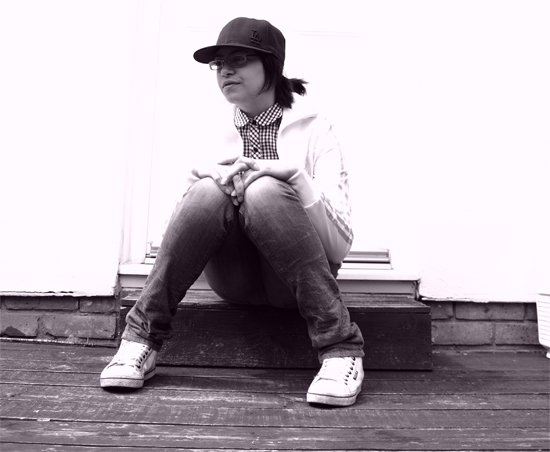The Hyperdub label has become notorious for gathering some of the most interesting minds in music around it. Dealing unabashedly in theory and musical history as well as sound, Hyperdub has acquired a diverse stable of highly-regarded artists. 2010 sees them release the debut album from producer Sara Abdel-Hamid, better known as Ikonika. Her ‘Please’ 12” shot across our bows in 2008, and the atmospheric half-beat of ‘Sahara Michael’ followed. A 2009 spent DJing throughout the UK saw crowds gradually acclimatising to her gloriously melancholy, hard-hitting dancefloor style. "Crowds have got a lot better now. A year ago, I’d get ‘play some dubstep!’" she laughs.
When I catch up with her, Ikonika is, suitably enough, fiddling with Ashanti vocal samples. "I see sampling as exercise, good production practice," she says. "I usually mess with some of my favourite R&B tracks from the 90s. And 00s, I guess: Ashanti, 112 are great, Mary J., Amerie."
Did you like her last album?
"No… [she hasn’t dared listen] I’m scared I might not like it. I swear she stopped working with Rich Harrison. I like it when she sings over those hard, New York at night kinda beats. I think she and The-Dream should collaborate."
As befits a woman who lists Amerie and Pretty Girls Make Graves among her influences, Ikonika’s album, Contact, Want, Love, Have, ("I got some of those word magnet things in my graduation goodie bag. Those four words were all stuck together. I just thought it was really beautiful," she says) is a genre-bending riot through new territory. Her style, which she describes elsewhere as ‘post-dubstep’, draws a line back through funky to garage and soca, adding 8-bit and R&B for good measure. Perhaps most startling is the album’s refusal to shy away from difficulty – both melodic and conceptual – and emotional impact.
"It’s an arcade game – a fight. Takes all your money," she jokes, alluding to the album’s frequent gaming references, before relenting. "My main aim is to change the dancefloor. I want people to feel emotion when they dance. Sometimes my music gives me flashbacks – it’s really weird. Like I’ll remember all the computer games I used to play, the music my sisters listened to, or the smell of my mum’s old car, stuff like that. Dancefloors are changing, and I like it."
Like that of her labelmate Burial, Ikonika’s sound can be read as a form of urban hauntology. In the treated, layered vocal dream-samples of ‘Continue?’, in the socatronics of ‘Look (final boss stage)’, Ikonika gathers the neon ghosts of London, the soundsystems and diverse voices that are so conspicuously missing from the rusticana of Derridean hauntology, and from the familiar, sinister rural Englishness of the Ghost Box. These are the ghosts of multiculture, the dancefloor’s shared dream, rallied at its moment of threat.
As respected music critics deride its diversity as tokenism, club culture is increasingly under attack from other institutions; venue after venue is threatened with closure, and police increasingly refuse licenses for black music events. It’s in this context that the importance of Ikonika’s challenge to her audience – to acknowledge the emotion and the history inherent in these sounds – can best be understood. In a recent interview, the producer half-joked that she wants to look up from playing to see her crowd dancing and crying.
"Haha. Yeah, I did say that. It happens sometimes these days, it is working."
When was the last time you danced and cried?
"Probably to Amerie – ‘All I Need’. That or The-Dream. Only in the safety of my bedroom though, never in a club. I just like melancholy melodies. I like hearing them and I like playing them. But the emotion needs bad boi beats in contrast."
Oh yes, those bad boi beats. They’re here on the album in abundance. Though Ikonika claims her rhythms are relatively straightforward – "I don’t understand why people call me wonky; I always liked straight beats" – she has a deep understanding of metre, of the pound and the pressure of beats, the way they nestle and the way they fight, gained behind the drumkit as a teenager in a metalcore band. But the hesher kid had other ambitions. "I wanted to make hip-hop and R&B," she says, "just sell beats to singers and MCs, get my hustle on. But then I discovered dubstep, and I was so intrigued by how many styles there are. Straightaway I heard Mala, Skream, Burial – all dubstep but completely different. Nowadays people regard dubstep as one thing, and I don’t get that."
As part of the Hyperdub stable, Ikonika is subject to a level of critical and theoretical interest that producers don’t always generate. On this website, Melissa Bradshaw, in her review of the Hyperdub 5 compilation and Kode 9’s book, Sonic Warfare, argued compellingly that Ikonika’s melodic difficulty was capable of mutating the dancefloor, derailing the gendered gaze. Ikonika agrees – "there are definitely more girls on the dancefloor" – but for her, it’s Kode 9’s own theoretical context that holds most water.
"Reading the inlay of the 5 compilation compressed everything – it made so much sense. Until that point I hadn’t really understood. Now I get that I’m part of this mutated virus, waiting for the strains that come after."
Though reluctant to make predictions, Ikonika has plans to start her own strains. A mix for fashion label Fenchurch is available on the music page of their website, and her remix of ‘Bastard Kids’ by The Brown Acid is now available. Perhaps most excitingly, Ikonika is plotting future sounds in the form of own label Hum & Buzz, with "collaborations with Optimum, and some stuff from Greena. Plus my friend Manara has recently got me into juke (Chicago booty house), so that’s going to start influencing my future productions, if it hasn’t already."
Contact, Want, Love, Have is released on Hyperdub on April 6



